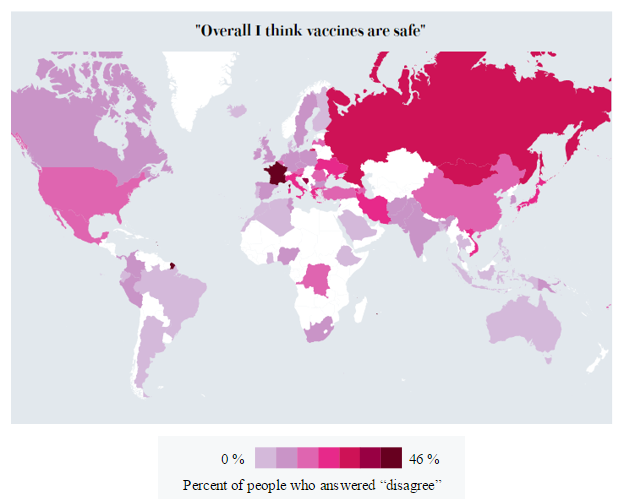Vaccines work. But the public isn't always convinced

From suspicions about safety to religious objections.
Image: REUTERS/Joseph Okanga
Stay up to date:
Future of Global Health and Healthcare
Vaccines have developed something of a PR problem in many places.
From suspicions about safety to religious objections, a vital medical advance, which scientific consensus regards as a universally good idea, has run into some serious opposition around the world.
The extent of the problem has been highlighted by new research which shows the results of a large international survey into attitudes towards vaccines. In all, 66,000 people in 67 countries were asked about vaccines and their thoughts on vaccine safety, effectiveness and compatibility with religious beliefs.
Now, the Scientific American has taken the data from the study and created a series of maps showing where attitudes are most negative and why.
Safety concerns

France stands out as the most sceptical nation when it comes to safety, but it is far from alone. Russia shows strong reservations while the United States, China, Italy and Greece are close behind.
There is still significant worry among the populations of Australia, Canada, India and much of South America and Western Europe.
Doubts about effectiveness

For many the worry is not about safety – they simply do not believe vaccines work. Russia and France are both shown to be sceptical with lower levels of concern evident right across the world.
Religious belief

When it comes to religious beliefs, a conflict seems to emerge in Southeast Asia and Mongolia. Whereas the public seemingly has little doubt as to the safety or effectiveness of vaccines, may eschew them on religious grounds.
As the lead author of the study, Heidi Larson, points out, “Public trust in immunization is an increasingly important global health issue. Losses in confidence in vaccines and immunization programs can lead to vaccine reluctance and refusal, risking disease outbreaks and challenging immunization goals in high- and low-income settings.”
General disclaimer: The designations employed and the presentation of material on this map do not imply the expression of any opinion on the part of the World Economic Forum concerning the legal status of any country, territory, city or area or of its authorities, or concerning the delimitation of its frontiers or boundaries.
Don't miss any update on this topic
Create a free account and access your personalized content collection with our latest publications and analyses.
License and Republishing
World Economic Forum articles may be republished in accordance with the Creative Commons Attribution-NonCommercial-NoDerivatives 4.0 International Public License, and in accordance with our Terms of Use.
The views expressed in this article are those of the author alone and not the World Economic Forum.
Forum Stories newsletter
Bringing you weekly curated insights and analysis on the global issues that matter.
More on Health and Healthcare SystemsSee all
Naoko Tochibayashi and Mizuho Ota
April 7, 2025
Charlotte Ersboll and Kusum Kali Pal
April 7, 2025
Vivek Vishal
March 31, 2025




